#thedas politics
Text
Why Vivienne Needs the Inquisition
No one 'winds up' at Court, my dear. It takes a great deal of effort to arrive there.
–Enchanter Vivienne to the Inquisitor
An ask I received (referring, I think, to something I said in this post, though I've alluded to it at other points as well):
How/why is Vivienne's position at court shakier than it seems? (Please publish this anonymously.)
Thank you for asking! I’ve wanted to write something on this subject for a while, so I appreciate the push to get it all down. It’s something I find really interesting about Vivienne, because it's something she doesn't want the Inquisitor, or anyone, to know, so it's all subtext in the game. Vivienne is a character who always holds the player character at arms' length--a bit less so when she likes them, but there is always some distance there. As such, she's a difficult character to get to know.
And while I do have some issues with the way Vivienne is handled in the game, particularly with narrative and quest design, I won’t be touching on those heavily here. For this post I want to focus on what can be determined about her motivations from the character as written.
Vivienne can be recruited to the Inquisition after the Inquisitor's first trip to Val Royeaux. Notably, she seeks out the Inquisitor's attention herself, inviting them to a gala at the Duke of Ghislain's estate, and also notably, once recruited she will not leave the Inquisition and cannot be forced to leave, no matter how low her approval of the Inquisitor. This is also something I have seen people question: why can't you kick Vivienne out, and why won't she simply leave if she disapproves of your choices? I hope this post will answer that question as well.
The most critical aspect of Vivienne's character to understand, I think, is that she has no stable institutional power. She is not a noble. She has no familial connections of the sort that can help even a mage to keep their head above water. She is a woman who was taken from her family at a young age and raised in an institution, and who has used all her wit and charisma to make the very best of that situation for herself.
Vivienne's position as First Enchanter of Montsimmard is mostly an achievement within the Circle itself. Montsimmard itself, however, was also a stepping stone to influence outside the Circle. Personally, I think the fact that Vivienne declined to join any fraternity when she became a full Enchanter, a shocking move at the time, indicates that she held ambitions outside the Circle from a young age. And Montsimmard was the perfect proving ground for her, a major Orlesian city whose ruling family maintain close relations with the Circle. In The Masked Empire, the Marquise de Montsimmard boasts about dining at the Circle, and she and her husband wear masks adorned with lyrium crystals which we are told were a gift from the First Enchanter. It seems likely, though not confirmed, that this was Vivienne herself.
(Incidentally, it is a real shame that Vivienne’s character seems to have solidified so late in the game’s development, because in retrospect I really feel her absence in the novels. She gets a brief mention in The Masked Empire as Madame de Fer, and absolutely nothing in Asunder, which we'll come back to.)
It seems that the Montsimmard mages were called upon with some regularity to entertain the court, and this is how Vivienne first caught the attention of Duke Bastien in 9:16 Dragon. Within a year, she had moved into a suite in his estate. Her position came under attack for the next few years, but nonetheless, after a single meeting with Empress Celene in 9:20 Dragon, she became the newly-crowned Empress's Court Enchanter.
(Edited to add: It seems to be sometime after this that Vivienne became First Enchanter of Montsimmard, at "an age young enough to cause scandal," though the date is never confirmed that I can find. Incidentally, as @shrovetidecat brought to my attention in the notes, Fiona is also supposed to have been Grand Enchanter of Montsimmard, which given that may be a lore inconsistency, unless Vivienne is only meant to have taken the position after Fiona rose to Grand Enchanter—and I'm not sure why a 40-year-old First Enchanter would be scandalous.)
By the time she meets the Inquisitor, she is likely somewhere in her 40s, and has been the Enchanter to the Imperial Court and the Mistress to the Duke de Ghislain for twenty years. She regularly mingles with the court and has built a practically unprecedented influence for herself in Orlesian high society.
And it's all about to fall apart, for three critical reasons.
First, the obvious: the mage rebellion. One cannot be First Enchanter of a Circle that no longer exists, though Vivienne certainly tries. A majority of mages, even if by a razor-thin margin, have declared that they do not recognize the Circle's authority—and therefore Vivienne's authority as a loyal Enchanter within that system.
I think Vivienne's dialogue with the Inquisitor and her remarks if taken to Redcliffe reveal a deep frustration and resentment of Grand Enchanter Fiona, who called for the vote to leave the Circle and now leads the rebel mages. Vivienne of course handles this in the manner to which she is accustomed, the culture of the Imperial Court, in which trading in verbal jabs and barely-veiled insults is a standard matter of social one-upsmanship. Outside of that environment, she comes across as petty and rude, which is an interesting point of characterization in itself: Vivienne has thrived in the court environment, but she does seem to have a bit of trouble adapting her manner to different circumstances, where that sort of thing might not benefit her. But what she's trying to do is frame herself before the Inquisitor as the reasonable and respectable mage, and Fiona as misguided and pitiable. How well this goes for her, of course, depends on who the Inquisitor is. But the effort itself kind of reveals the shaky ground she's standing on.
In her dialogue with the Inquisitor, Vivienne claims that as the rebel mages follow Fiona, the loyal mages follow her. But where are these loyal mages? There's maybe one or two mages we meet in the game (Enchanter Ellendra comes to mind) who seem to respect Vivienne's word. But if the loyal mages look to her as a leader, why is Ellendra alone in a cave in the Hinterlands to begin with? Why doesn't Vivienne bring a group of these loyal mages with her to Skyhold?
I think it's because Vivienne doesn't truly have followers among the mages, the way Fiona does. This is the story she's telling the Inquisitor, to capitalize on the idea that the rebel position is not a consensus, and also that she still has influence among a significant number of mages. The truth is, she doesn't. She’s spent most of her life courting influence outside the Circle, not in it. She has presided over a Circle where she doesn’t even live day-to-day. I can’t imagine that has particularly endeared her to many of her fellow mages, even the ones who are loyalists or moderates.
Contrast this with Wynne, a pro-Circle Aequitarian who is deeply involved in Circle life despite undertaking sanctioned work outside the tower, and is also deeply involved in the events leading up to the vote for independence. Whatever the Doylist reasons for Vivienne's absense from Asunder, the fact remains: she's just not there. She has no presence in the events leading up to the rebellion. When speaking critically of Fiona's vote, she discusses it in the context of Anders' attack on the Kirkwall Chantry, and says nothing of the circumstances surrounding Fiona's push for a vote—not the revelations about Tranquility, not the conclave (no not that Conclave, the conclave of mages at which Fiona called for the vote for independence), not the subsequent massacre by the templars and the remaining mages' decision to stand and fight. And perhaps most notably, no one mentions Vivienne, positively or negatively, during the events of Asunder. Not once. We are left with the conclusion that Vivienne is simply not heavily involved in Circle politics, no matter what impression she may wish to give the Inquisitor. Her influence does not lie within the Circle.
And I think Vivienne knows this, and realizes that it's suddenly become a big problem for her.
The second big problem is Morrigan.
Vivienne has had the favor of the Empress herself for twenty years. She has, by others' accounts, managed to turn the position of Court Enchanter from "little more than court jester" to a position of influence and respect. And then the Grand Duke attempts a coup, and the Empress's elven lover runs away with a dangerous secret, and suddenly the Empress is enlisting the services of some unwashed swamp witch while Vivienne is standing right there!
Like I cannot overstate what a absolutely galling slap in the face it would be to Vivienne that even as she is attempting to uphold the legitimacy of the Circle and thus of her own authority within it, Celene effectively creates the "Arcane Advisor" position as "Court Mage 2: Apostate Boogaloo" just so she can get advice on non-Circle-approved magics. Advice that Vivienne could not give even if she wanted to, even if the Empress asked, because she has no knowledge of eluvians and ancient elven magic.
Both Dorian and Cole needle Vivienne about her jealousy of Morrigan, and I think quite accurately, no matter how quick Vivienne is to deny it.
Her influence over the Empress is fast eroding. She has been replaced in all but name.
And the third and most personal big problem is Bastien's illness.
Vivienne has enjoyed a romance with one of the empire's most influential nobles for twenty years. She has lived in his home and been on good terms with his wife until her passing. Her influence in the Imperial Court owes a lot to Bastien's affections. Bastien is not only a Duke but a member of the Council of Heralds, the political body responsible for overseeing matters of titles and inheritance in Orlais. They are quite literally the most powerful group in the country; even the Empress rules at their favor, without which she would never have gained the throne in the first place.
And now Bastien is dying, something Vivienne takes care not to mention to the Inquisitor at first. It's not until after the ball at the Winter Palace that Vivienne asks the Inquisitor for help with her potion in a last-ditch attempt to prolong his life—and even then she does not reveal her true purpose until after the Inquisitor has returned with the wyvern's heart. And while it's possible to interpret multiple ways, I personally believe from her response to his death that she did care for Bastien. She didn't need to bring the Inquisitor to his deathbed at all, if she wanted to continue concealing his illness, something she's taken care to do up until that point. It bespeaks a measure of trust that she allows the Inquisitor to see her so—in her grief, as well as in her loss of position.
Because Bastien's death is a terrible loss for Vivienne socially as well as personally. Bastien's son will inherit his estate, and whether Vivienne is allowed to go on living there will be entirely at his discretion. Perhaps he will permit her to stay, but she cannot count upon his grace, nor upon the protection she enjoyed with Bastien any longer; and furthermore if she is allowed to stay, it will be a favor to her, making her beholden rather than granting her greater influence. She won't have the dignity of being Bastien's widow; she is his mistress, and respected as that position may be in the Orlesian court, it gives her no true claim to his family.
Vivienne is about to lose everything she has built for herself.
Without Bastien, without Celene, she will be left with… what? The position of First Enchanter to a Circle that no longer exists? If her own best-case scenario occurs and the rebellion is halted and the Circles are reinstated, then she still loses all the freedom she has gained and is forced to return to a Circle tower herself—a sphere in which, as previously discussed, she holds less influence than she would like the Inquisitor to believe. Even if she remains First Enchanter, it's hard to see this as anything but a massive step down in the social hierarchy, the beginning of a long slide into what the Fade reveals as her greatest fear: irrelevance.
It's a humiliation that Vivienne cannot bear.
This is why she won't leave the Inquisition, no matter how much she may despise the Inquisitor. Vivienne needs the Inquisition far more than she lets on. This even puts the petty low-approval furniture-moving scene into context. Yes, she’s doing it to snub the Inquisitor, but that doesn’t actually gain her anything. I think it’s deeper than that. The Inquisition was Vivienne’s fallback plan, and it’s not going well. The Inquisitor is making her look bad, she is finding no avenue to further advancement here, but she can’t leave. So, her response is to try to reclaim some sense of control over her life, asserting a kind of power she had at Bastien’s estate and was likely denied in the Circle: control over her own space.
Even if Bastien were to live a bit longer, Vivienne really has nowhere higher she can climb in the Imperial Court. She can't become a noble herself. She can't marry Bastien, or any other noble for that matter, because she is a mage. And I'm sure she's highly aware of this fact. Bastien is several years a widower himself; it is not his former marriage that prevents him from marrying her, now. It is her status as a mage which bars her from entering a noble family, legally, socially, politically. That Bastien never seems to have raised the question at all speaks to the fact that no matter how much he may have stuck his neck out for Vivienne, there was a line even he was not interested in crossing.
So where does she have to go from here?
Along comes the nascent Inquisition. Shaking things up. If any organization could rattle the gilded walls of the Chantry, it's this one.
Why not take a stab at the Chantry, at this point? What does she have to lose?
It didn’t really sink in for me for several playthroughs because she isn't wearing cleric's garb, but Bastien's sister Marcelline, who visits Skyhold after his death with Bastien’s son? She's a grand cleric. One of the surviving grand clerics who will decide the next Divine. Vivienne involves the Inquisitor in her plan to save Bastien, a plan she likely knows will fail—but she puts in the effort. She then introduces the Inquisitor to Grand Cleric Marcelline, having told her how the Inquisitor came to her aid. Marcelline expresses gratitude: “Madame de Fer has told us what great trials you faced, trying to save my poor brother’s life.” Bastien’s son Laurent is a powerful ally in his own right, now a member of the Council of Heralds, but also likely the one who will decide whether Vivienne keeps her suite in the Ghislain estate.
And if the conversation goes well, Vivienne tells the Inquisitor that it was "quite the triumph." If the Inquisitor expresses confusion, she patiently explains the influence that both Laurent and Marcelline wield, and that they have now secured the trust of both. If Vivienne becomes Divine, Marcelline’s favor no doubt goes a long way in getting her there.
Of course Vivienne will continue to take a conservative position on the mage question. A mage looking to insinuate herself into the Chantry hierarchy would have to, just as a mage seeking the freedom to consort with the court would have to. In the same way that a Hawke with aspirations of seizing the vacant seat of Kirkwall's Viscount must side with the templars at the end to show the nobility that they represent stability and order, the Chantry's first mage cleric must be pro-Circle, pro-templar, conservative to the bone. Vivienne seems to recognize this as far more important than actually appearing devout. It's also fascinating to me how little she bothers to make any pretense of a personal faith, instead always discussing the Chantry as an important social institution and political body. And this attitude doesn't seem to impede her chances at the Sunburst Throne very much, no more so than being a mage already would.
Vivienne knows exactly what she's doing. She always has.
Vivienne comes to the Inquisition seeking power and influence in the Chantry because her position among the nobility is falling apart. Whether she comes in with the intention to reach for the Sunburst throne itself is debatable, and I personally think it might have been the intent that she does have that ambition but seeks to let the Inquisitor think it was their own idea, though I'm iffy on how successful that is if it was the intent. Nonetheless, I do believe that Vivienne comes to the Inquisition with the intent to seek influence within the Chantry, realizing that the recent upheaval may offer her a unique opportunity to do so. And depending on how closely the Inquisitor aligns with her goals, she may succeed quite dramatically.
References
Codex Entry: Madame de Fer
Talking with Vivienne at Haven and Skyhold
Vivienne's high disapproval scene
After Bastien's death
Banter with Cole
Banter with Dorian
The World of Thedas vol. 2, pp. 235-239 (hardcover edition)
Dragon Age: The Masked Empire, p. 31 (paperback edition)
#vivienne#madame de fer#dragon age meta#dragon age inquisition#the masked empire#asunder#bastien de ghislain#blunders of thedas#ask anne#thedas politics
262 notes
·
View notes
Text
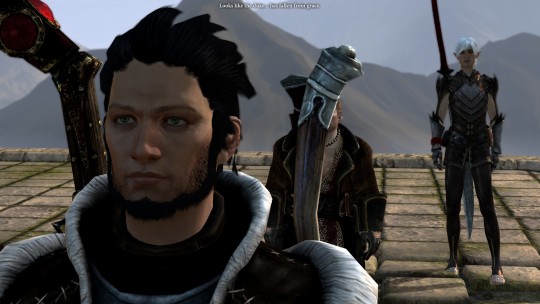
badum-tss
#this line is so ridiculous i love it so much#100% that was varrics doing lmao#laya plays dragon age#mota#the political aspect is inchresting too but it is. too late for me to think about that lol#(in the day. not in general lmao)#(also i have no mental timeline of political affairs in thedas in my head so theres that xdd)#seems awfully suspicious tho that the orlesians had the tome of koslun and now they got sb trading important secrets with orlais?
8 notes
·
View notes
Text
and on what grounds is divorce allowed under the chantry. this haunts me.
#like both for political reasons and also probably religious ones i highly doubt no fault divorce is a thing in thedas.#that seems a bit much.#so like...how was cailan going to hypothetically divorce anora#text
24 notes
·
View notes
Text
Thinking about the Chantry and the Amaranthine Wardens being in a really tense ongoing standoff from either as soon as the Warden takes their post (if they're from a group the Chantry Does Not Approve Of) or from as soon as the Anders stuff really kicks off, right the way through to DAI and beyond.
I mean, the Warden might well hate the Chantry, especially if you're playing Surana/Amell (because Circles) or Mahariel (because Exalted March), but also just if they got on well with Anders and/or Justice. But the thing is that the Warden can't really openly act against the Chantry as a whole, because it's the dominant religion and has a habit of calling holy wars on anyone who tells it to piss off. Weisshaupt wouldn't help because Weisshaupt is run by jackasses, and while Alistair doesn't much care for the Chantry neither possible monarch would want to bring an Exalted March down on Ferelden by picking a fight. And Hero of Ferelden or no, the Warden's only got a handful of people who would absolutely join them in trying to kick the shit out of the Chantry, so actively going after them would end poorly. But on the flip side the Chantry can't openly target the Hero of Ferelden, because that would absolutely spark uprisings. The people of Ferelden adore their hero. Plus, the king of Orzammar owes the Warden his crown and the Chantry can't risk pissing off the dwarves and losing access to the lyrium supply. And one of their best friends is the Left Hand of the Divine and is terrifying. And another one of their best friends is the fucking Arishok, who probably wouldn't speed up the invasion plans to avenge his fallen kadan, but does the Chantry really want to risk that? Absolutely not, they aren't stupid. And if the Chantry openly fucked with their most visible and well-loved member without some serious provocation, the other Grey Wardens might actually step in. So the Chantry can't touch the Warden so long as the Warden doesn't give them incontrovertible evidence that they're actively plotting against the Chantry. So basically Amaranthine and the Chantry have spent the last decade totally deadlocked, because the Chantry can't do anything to the Warden without risking some serious, possibly devastating backlash and the Warden can't do anything to the Chantry without giving them an excuse to crush the Ferelden Wardens as they've undoubtedly wanted to do for years. They're basically just being nuisances to each other whenever possible because anything more could risk Consequences.
#dragon age origins#hero of ferelden#...it occurs to me that the warden has strong ties to every major power in thedas except tevinter#orlais through leliana and her ties to the divine. ferelden through alistair and anora (whoever's on the throne owes them for it)#orzammar through the king and the qunari through the arishok formerly known as sten#they just need someone high up in tevinter politics and they'll have a full set!
126 notes
·
View notes
Text
Project 137.43.M.D. - TheDae - E, 71 chapters, Words: 134,160 - Inmate 43.M.D. has served the ten year sentence for his involvement in Voldemort's war. However, Decree 137 of the new Offender Rehabilitation Act states that former Death Eaters must be Obliviated prior to their release from Azkaban in order to protect the magical population. With the help of a Mentor provided by the Ministry of Magic and a Memory Modification, the perpetrators should be given the opportunity to reintegrate seamlessly into wizarding world. Inmate 43.M.D. is also to be rehabilitated, which presents the Mentor assigned to him with one of the most difficult tasks of her life.
#author: thedae#progressive relationship#trials#smut#draco's redemption#angry sex#hurt and comfort#ministry and politics#hermione: ministry worker#hermione's pov#draco's pov#hate turns to love#theo#pansy#ron#blaise#rehabilitation#ginny#harry#azkaban#memory modification [draco]
13 notes
·
View notes
Text
guys, i know the title seems silly and obvious to the fans of the game. but the title of the game isn’t really for us as weird as that sounds.
There’s a whole group of people who are new to the franchise who don’t know anything about the lore and are gonna hope onto that as their first game. The same thing happened when Inquisition came out.
Fans are already customers, we’re going to buy and play the game because Dragon Age. Potential customers have no attachment to Dragon Age and don’t know what the fuck a Dreadwolf is other than it sounds kinda cool.
they’ve been ramping up the Dreadwolf campaign since 2018, it’d be a really weird pivot if they moved away from that.
speaking as someone who works in marketing for a living.
#dragon age#like i get it some people hate the egge#i cannot wait to punt solas into orbit so he can become thedas's third moon#you don't have to like the name#but solas has been set up as the main antagonist since tresspassers so idk what to tell you#we all know dragon age doesn't stop at one big bad#Fereldan Politics Loghain and the Blight in Origins#Bartrand the Qunari and Merideth in 2#The Mage Templar war and Corypheus in Inq#there's is a high probability that the game will not be the Solas Show
8 notes
·
View notes
Text
I’m rewatching the duel cutscene for Josephine’s romance (because I’m love her and I’m also love my Inquisitor) and I still can’t believe how dirty they did my boy Kaaras. He’s a Warrior with the Champion specialization. How could he stumble his way around a duel like that
I can only headcanon that he’s trying really, really hard not to kill Otranto. It would be very easy for him. Otranto is a human noble well-versed in fighting with a rapier. Meanwhile Kaaras has soloed high dragons
#I just feel like shit and I want him back (Kaaras)#The Worst Squad in Thedas#Kaaras is Just A Guy who accidentally stumbled his way into high-class society#Half because they have venerated him as a political/religious figure (unwanted)#And the other half because his girlfriend is the eldest of House Montilyet
3 notes
·
View notes
Text
listen. I just. love lil guy Amis du Peren beside these legendary mages with commanding presences and powerful offensive magic. meanwhile he has the stage presence of a church mouse and has brewed a nice cup of tea for that sniffle you're developing.
#OOC / HOLLY.#he's powerful in a way but a powerful Healer#he is not a fighter and he does not care to be#he can defend himself and this is quite sufficient#instead he is prevalent in folk tales across southern Thedas as a healer and a physician with Compassion ever at his side#[if you go to certain places esp where the Chantry is strongest he might be twisted into a figure of ill omen#but that's politics bending folk tales to its whim not reality]#anyway. lil guy. undead legend. the most understated member of your party#but one of the most knowledgeable and useful in a practical sense
1 note
·
View note
Text

Obsessed with this part of the Wikipedia page for 76-year-old sociologist and political scientist Theda Skocpol
1 note
·
View note
Text
genuinely i think broncarm is the funniest worldstate. first you have the hero of ferelden, that guy who killed the archdemon and lived to tell about it. his twin brother is the king of ferelden who fucks so hard that he began to cast doubt on the divine right of kings shit ferelden has going on. their mutual close personal friend is the viscountess of kirkwall who for the first time in as long as anyone can remember has the templar order by the dick and not the other way around. and all three of them are buddies of the inquisitor who has recognised titles in at least 3 separate societies. if i was a hater of any one of them i'd just walk into the ocean and call it a day
#literally so funny the political monopoly they have on thedas#not even mentioning the inquisitor and a tevinter magister#or the hero of ferelden and the arishok of all people#ocs#fereldens finest#no other worldstate achieves this btw#worldstate of girlbosses (gender neutral)
0 notes
Text
Meredith's Mistakes: A Study in Power
The full-scale rebellion of mages across Thedas against the Circle system of the Andrastian Chantry officially begins in 9:40 Dragon, with the uprising at the White Spire and a vote by the College of Enchanters to separate from the Chantry. But the seeds of the rebellion are planted years earlier in Kirkwall, where the extreme Circle policies of Knight-Commander Meredith Stannard lead to the destruction of the city’s Chantry by apostate mage activist Anders.
Knight-Commander Meredith’s reign of terror over her Circle and over Kirkwall itself is abruptly ended during her battle with Hawke when the sword forged from a red lyrium idol found in the Deep Roads corrupts her totally, turning her to a frozen lyrium statue herself (though as we have more recently learned, it did not destroy her completely). This was catalyzed by the destruction of the Chantry, Meredith’s invocation of the Right of Annulment, and the mages’ subsequent resistance. But had all that not happened the way it did, I believe that an end to Meredith’s rule had already become inevitable. The Knight-Commander makes several grave mistakes in maintaining her power, some of which begin years before she acquires the idol, but are dramatically escalated by her exposure to red lyrium.
And it’s because of those mistakes that the mage rebellion truly has its roots in Kirkwall.
Circle Dispensation
Throughout the Dragon Age universe we meet mages like Wilhelm Sulzbacher, Ines Arancia, Severan, Vivienne, Finn, and Wynne: Circle mages given special dispensation to travel, work, and even live outside the Circle proper.
This privilege proves to be a highly effective tool of Circle control, and a critical part of the Chantry's strategy for keep mages contained.
Prior to the the destruction of the Kirkwall Chantry, it seems that this sort of thing is quite commonplace in most Circles. Not for most mages, of course. But for well-established Enchanters who have proven their magical competency, and most importantly their loyalty, certain privileges may be afforded. Thus, compliance is incentivized for any mages who might aspire to some limited but additional freedoms and are willing to toe the line to get them.
In most cases, these mages are still denied the rights of non-mages: to own property, to hold a title, to marry and raise a family. (Wilhelm is a notable exception to the latter, but this seems rare.) But a mage like Ines Arancia might be afforded the opportunity for field research and publication. A mage like Wynne or Finn might gain the prestige of traveling at the side of a hero. And a mage of ambition such as Severan, Wilhelm, or Vivienne might even attain the title of Court Enchanter, serving at the side of a King or an Empress (even if the title is in many cases purely ceremonial) and mingling with the court.
Here's a basic principle that is critical to understanding politics, real or fictional: most people are primarily concerned with the material wellbeing of themselves and their immediate loved ones. Many people will engage in various forms of activism in the hopes of improving conditions for themselves and others, but truly revolutionary activity is an extremely unappealing prospect for the average person most of the time. And it's not because they're callous or apathetic. It's because they have too much to lose. Revolution is bloody and horrific and sometimes necessary, but there are always heavy costs to be weighed against the potential (and by no means guaranteed) gains.
It is no accident that of the mages we meet and get to know personally, the ones with the most to say in support of the Circle are also the ones who have gained significant privileges within that system—and who therefore have the most to lose from an attempted rebellion which may not succeed. I have written before about the conversation between Wynne and the Warden in Awakening, in which Wynne expresses concerns about the College of Enchanters potentially voting to break away from the Circle. "The mages will never be free," she says. "The Chantry would never allow it. Our only hope for survival is to show them we can be trusted."
Notably, at this point in time, even Anders will agree that this is "madness" and "a recipe for disaster." Why would Anders, of all people, say this, given how adamant he is about his own freedom? Awakening Anders sums up what he wants out of life pretty well when he says, "All I want is a pretty girl, a decent meal, and the right to shoot lightning at fools." He's being glib here, of course, and there's probably a lot more going on under the surface (we're given to understand later that Anders has always had a lot of anger at the Circle), but I do think it's accurate to say that at the moment he's mainly concerned with maintaining his own freedom. And while he and Wynne have very different opinions of the Circle generally, I think Anders doesn't at this time relish the thought of a full-scale war, with Templars roaming the land hunting renegade mages. You can see how that might actually make it harder for him to fly under the radar as an apostate.
Nearly a decade later, Vivienne will express her own opinions on the mage rebellion that is already well underway, calling it "A failure of perspective that infected Circle leadership." Unlike Wynne, Vivienne's objections are less about the unstoppable power of the Chantry and more about the attitudes the general population holds toward magic. "Kirkwall gave the world a reason to remember its fear of magic," she says. "A mage killed hundreds with a snap of their fingers. …By voting when they did, my colleagues all but declared war upon the ordinary people of Thedas, a war in which we are outnumbered a hundred to one." Vivienne's argument (if you take it at face value) is that the rebellion was poorly timed and generally unwise. "By all means, protest abuses by templars," she says. "Just don't do it in a way that suggests mages support wholesale murder."
Notice that Wynne does not say that mages shouldn't be free but that they won't be free. She does not say that bowing to Chantry oversight is the right thing to do but that it is mages' only hope for survival. Vivienne's objection (as stated, anyway; Vivienne’s motives are complicated and another post for another day) is not that the vote for independence supported murder but that it appeared to support murder. In these conversations, the argument is never really that mage rebellion is immoral, but that it is unwise, impolitic, bad optics, bad public relations, not smart.
A point on which even Anders once agreed.
And why would a full-scale mage rebellion look like the best option to Wynne and to Vivienne—to mages who have spent years and decades working to gain the respect and trust required to be granted the maximum amount of lenience the Circle allows? Why would they throw away what they have gained for a war they don't believe they can win?
If enough mages believe that compliance is a more reliable strategy than resistance, you won’t get the critical mass for a rebellion.
But even Wynne fights back when the Right of Annulment is invoked upon her Circle.
One of the most foolish things a ruler can do in terms of maintaining their own power is to allow conditions to deteriorate to the point where their subjects feel they have little or nothing left to lose. And that's exactly what happens in Kirkwall.
This is Knight-Commander Meredith's first mistake: she fails to positively reinforce compliance.
We get the sense that the Gallows was always a strict Circle. There's talk of the Knight-Commander's severity when Hawke first arrives, long before Meredith gets her hands on red lyrium. The kind of special dispensation that Wynne and Finn enjoy from the Fereldan Circle is likely far less common here.
There is some evidence that such things occur under Meredith, even post-lyrium-sword, however rare it may have been. Notably, if Bethany Hawke goes to the Circle, she is given permission to go with Hawke to the Vimmark Mountains, and to Chateau Haine. In terms of game mechanics, this is obviously done so that the player can have a bit more time with their sibling as a companion, and for the Legacy DLC specifically, the Carta has actually been breaking into the Circle trying to capture Bethany, so it does make some sense that Meredith would want that dealt with, enough to let Bethany go with Hawke to deal with it.
But Chateau Haine is purely a pleasure trip, and Bethany is still allowed not only to leave the Gallows, but to travel outside Kirkwall with her sibling. It would be very easy for her to run away if she chose, and she would have a solid head start on the templars pursuing her. Bethany has demonstrated herself a loyal Circle mage at this point, with no intention of escaping, but I think that's not all that's going on here.
Let's talk about Emile de Launcet.
In Act III, Hawke is given the task—or has their arm twisted, depending on how you're playing—of tracking down three runaway mages. The first two, Huon and Evelina, are a blood mage and an abomination respectively and attack, leaving Hawke no choice but to kill them. The third, however, is a man named Emile de Launcet, who reveals that having been in the Circle since he was six years old, he simply wanted to live a little. He also reveals that he himself spread the rumor that he is a blood mage, hoping that it would make him seem "dangerous" and therefore more attractive to women.
It's easy to write off Emile as simply a fool, but I think there's more going on here.
How does a man who has spent almost his entire life in the Gallows, who is well-acquainted with the Knight-Commander's policies, think that telling people he's a blood mage is a good idea? In Act III? By this point in the game, it is well known that Meredith is accusing anyone who sneezes of being a maleficar; most of the Circle mages live in terror of just such an accusation. What in the Maker's name could possibly make this man believe that labeling himself a blood mage wouldn't get him killed, or made Tranquil, never mind caught?
Unless Emile de Launcet, the son of rich Orlesian expats (the Comte and Comtess Guillaume and Dulci de Launcet) has always received more leniency in the Circle than the average mage.
Bethany Hawke, daughter of Lady Leandra Amell who has come home to reclaim her family estate, sister of the Champion who saved Kirkwall from Qunari invasion, seems to quickly decide that life in the Circle isn't so bad. Undoubtedly, a large amount of Bethany's relief is she doesn't have to hide anymore and be constantly protected by everyone around her, and she appreciates the opportunity to be around other mages. But she also says in party banter that "The idea of the Circle is much more terrifying than the reality of it." She frustrates Anders with her acceptance of her new life, and judging by Ella's words, Bethany seems to encourage the apprentices she mentors to accept theirs as well.
Bethany and Emile's experiences with the Circle do not fully reflect what we know of the Gallows, and I think that's because they're both from noble families. This is important for other reasons too, and we'll come back to it.
But for now, what's worth noting is that the only examples we have of Meredith's leniency are for political expediency and accidents of birth rather than actively rewarding compliance.
I think it’s safe to say that even before things escalate to all mages confined to their quarters, not a lot of mages in the Kirkwall Circle are going out on leave for botanical studies. But as her paranoia deepens due to her exposure to red lyrium, as she begins to see blood magic and demons around every corner and in every person, Meredith stops rewarding compliance at all. There are no “good mages” and “bad mages”; there are only mages, not a one of whom can be trusted. Fewer and fewer privileges are afford to any mages in the Gallows, until eventually it is clear that all mages will be punished simply for being mages. There is no incentive for "good" behavior.
That's how you brew a rebellion, kids!
And when she invokes the Right of Annulment, not one of those mages has anything left to lose.
I am far from the first person to point out that Anders spends his first seven years in Kirkwall attempting to change things for the mages by relatively nonviolent means. He wins massive goodwill from Kirkwall’s lower classes with his medical clinic in Darktown. He appeals to the upper classes the only way he can reach them, through his impassioned writings on mage freedom. (And the upper class is a critical piece of the puzzle here, but we’ll come back to that.) He works with an organized Mage Underground to rescue as many individual mages from the Circle as possible.
But by Act III, the Mage Underground has been completely dismantled, and ambient dialogue in the Gallows tells us that Meredith has confined all mages to their quarters and has already sent for the Right of Annulment, well before Anders takes his final action. She has yet to actually receive permission, and we cannot know whether she actually would have, but given that Divine Justinia has already threatened an Exalted March on Kirkwall through her Left Hand, it doesn't seem out of the question that Meredith's request would be granted so long as she provided the Divine with a plausible excuse. It is also very possible that in the absence of a reply, Meredith simply would have invented an excuse to invoke the Right without waiting for permission (given that she does exactly that after the Chantry explosion), and it's likely that is exactly what Anders—and every mage in the Circle—fears will happen.
And had that happened, every mage in the Gallows would have been locked in their quarters, alone, when templars came to their door to kill them.
By destroying the Chantry when he does, Anders provokes Meredith to invoke the Right of Annulment without waiting for Chantry permission, but critically he also does so in such a way that the mages have advance warning of their sentence. They have time to gather and organize, to fight back, to allow at least some of them to survive. Anders has broader goals for a mage rebellion, absolutely—goals which may or may not be met. But his immediate goal is to give the mages in the Gallows a chance to survive. And he does succeed in giving them that chance, regardless of what happens after. He also kills hundreds of people, many of them not templars or clerics but simply citizens of Kirkwall caught in the fallout—many of them undoubtedly lower-class citizens of Lowtown, including elves in the alienage. (The collateral damage is canon, and not just per dialogue in Inquisition; you can see flaming debris raining down over the place where Hawke is standing in Lowtown after Anders sets off the explosion, and Lowtown is on fire as you make your way to the docks, so this really isn't a point I'm interested in arguing.)
Whether Anders’ actions are morally justified, what kind of collateral damage is justifiable in the process of liberating an oppressed people, ultimately comes down to a trolley problem; I’m not going to get into that here and I’d appreciate it if people would refrain from having that argument on this post. What I do hope to demonstrate here is that something like what Anders does is the predictable and inevitable outcome of conditions deteriorating and abuses escalating for a subjugated people until there is quite literally nothing left for them to lose.
That is, in my opinion, Meredith's biggest and most obvious mistake. But there are two other failures that contribute to her downfall, and which I believe would eventually have led to her being removed from power.
The Absent Puppet
Following the failed Qunari invasion, Meredith increasingly alienates the nobility of Kirkwall.
There is an excellent post by @mllemaenad analyzing Elthina’s strategy for “mediating” the mage-templar crisis in Kirkwall and maintaining her own power. This post touches on Meredith’s second and third mistakes in several facets and it's also a fantastic analysis of Elthina's character that really helped me to understand her; I'd highly recommend reading it.
I have on occasion sees the nobles' opposition to Meredith read as support for mage freedom. I strongly disagree; that is not what’s going on here. This is apparent if you’ve played both the templar and the mage endings of DA2 and paid attention to the epilogue slides. Hawke can actually become the next viscount of Kirkwall—but only if Hawke sides with the templars.
The nobility on the whole do not want the Circle abolished. They are not interested in opposing the Chantry outright; when Elthina "gently" sends them home after Orsino's speech, they all comply. They were even willing to tolerate blatant Chantry puppet Marlowe Dumar as Viscount. Let's be clear here, the Chantry has ruled Kirkwall in all but name since the deposition of Perrin Threnhold. The nobles know this. (Even the random nobody city guard Hawke speaks to at the beginning of the game knows this; it's the worst-kept secret in Kirkwall.) So long as there is a noble ass on the throne, the Chantry maintains at least the appearance of a "proper" social order, and the nobles are willing to live with that because it does not overly inconvenience their lives, and as established previously, their own mage children will receive some leniency in the otherwise strict Circle.
Meredith openly seizing control of the city is a bridge too far. The Knight-Commander cannot rule the city outright; this is not how things are done. The nobles want to unseat Meredith, but they do not want a rearranging of the social order as they know it. That means a functioning Circle of Magi that keeps the mages contained over there, where they don't have to think about them, and a proper noble ruling the city at least in name. They do not want a coup by an anti-Circle radical. If Hawke fights with the mages, the nobles will not support Hawke as Viscount. But a pro-templar Hawke by the end of the game has accomplished what the nobles want. They have removed Meredith from power, while demonstrating to a city that still fears magic that they will continue to keep mages subjugated.
The Chantry and the nobility are always deeply intertwined, but the Chantry in Kirkwall has a particular stranglehold on the city’s civil government, more so than in other nations. That the nobility have been pushed to the point of opposing Meredith at all speaks to how gravely she has fucked up.
Chantry Authority
And finally, as MlleMaenad aptly explains in the post linked above, Meredith has alienated her superior in the Chantry, Grand Cleric Elthina—in part because she has stopped playing the game they both once implicitly agreed to. Her abuses of power have become too public. She has agitated the mages to the point that her First Enchanter is out protesting in the streets. In Hightown. She has alienated the nobility and turned public opinion against her. And that makes the Chantry look bad in turn. It makes Elthina look bad. If nothing else, it makes Elthina look like she (and by extension the Chantry) no longer has control over the Circle, and that’s a big problem. Elthina deftly distracts everyone from this problem by pretending to be a third-party mediator between the mages and templars instead of the person holding jurisdiction over all of them. But the conflict spilling into the streets of Hightown is a big problem for her.
As detailed by MlleMaenad, Elthina has no problem with what Meredith has been doing to the mages. She does have a problem with Meredith ranting and raving about how mages should be made an example in public, in front of the nobility—some of whom have family members in the Circle. (Again, this is why Hawke meeting Emile de Launcet is so important. This is why you have to talk to his parents, so that there can be no mistake about who he is.)
My one quibble with the excellent post linked above (and it’s largely a semantic quibble and not a practical one) is the statement that Elthina has no morals. I would argue that from Elthina’s perspective she has a very strong moral code—one that demands she defend the authority of the Chantry against all threats and at any cost, including the cost of her own life. Which is exactly what she does.
Multiple times, Elthina can be warned of the danger to her life if she stays in Kirkwall (once in Sebastian’s DLC sidequest “Faith,” and once if Hawke chooses to warn her about whatever Anders is planning). In both cases, she refuses to leave. “I am Grand Cleric,” she says. “Who would dare attack me?”
It’s easy to look at Elthina as simply overconfident, and I certainly agree that there’s an arrogance to her personality and the way she handles things in Kirkwall. But I’m not actually sure that her death is a political failure. I don’t mean that she wants to die, or that somehow she plans to. But to leave Kirkwall to protect herself would show weakness—not only in herself as an individual, but in the institution she represents. In refusing to flee from danger, and in dying for that decision, Elthina makes herself a martyr for the faithful. And in doing so, she probably sways a few people who might have at least sympathized with the mages to oppose the rebellion more harshly than they might otherwise have done.
That death, that martyrdom, serves as a pretty effective distraction from the fact that Meredith, whose actions made something like Anders’ actions inevitable, is Elthina’s problem to begin with. Indirectly, Meredith has become a threat to the Chantry’s power over Kirkwall, and she cannot be easily replaced without a tacit admission that Elthina has already failed to maintain control of her own Knight-Commander. If Elthina’s end goal is to maintain the power of the Chantry over Kirkwall at any cost, standing her ground to the point of martyrdom isn’t a bad gambit. It’s bad for Elthina herself, of course, but for the Chantry? Grief over her loss brings sympathy for her side and aid from Starkhaven by Sebastian’s hand, thus maintaining a Chantry presence in Kirkwall after the disaster and reinforcing the very useful image of the Chantry as a charitable organization, cruelly destroyed by a madman.
That’s a powerful narrative, and Elthina’s choices help create it.
But it only becomes necessary in the first place because Meredith, after years of success, is failing to maintain her power—in part, thanks to the arrival of an outside variable that no one could have foreseen, the red lyrium that pushed her existing paranoia to the breaking point.
Had Anders not destroyed the Chantry, the Meredith Problem would only have continued to escalate. At some point Elthina would have had no choice but to remove her from power, because the damage to Chantry authority of allowing her to continue would outweigh the damage of removing her. There are conceivably ways Elthina could go about this indirectly, giving the appearance that the Knight-Commander had been killed by a rebellious noble or even a blood mage, thereby avoiding any official admission of failure by the Chantry. Her priority would not be to replace Meredith with someone more lenient, but rather with someone able and willing to play the game, the same one she and Meredith played so well together before Meredith went off the rails. Keep the nobility complacent and the underclasses powerless. Maintain the balance. Protect the Chantry’s authority at all costs.
It would likely be quite troublesome to arrange, and Elthina thus far has been loathe to do it, but I don’t doubt that she would do it if she had no choice. And given what we have seen of Divine Justina and how she operates (see also: @v-arbellanaris’s excellent meta series on Justinia and particularly part 3) I feel confident saying that Justinia’s message to Elthina in “Faith” is both a warning and a threat: Get your city and your Circle under control or I will do it for you.
I also think that Sebastian, whose entire character exists at the intersection of Chantry and noble politics, realizes this, hence his urging Hawke to downplay the situation in Kirkwall to convince the Divine that her intervention is not necessary. For all Sebastian’s faults, at this point in his arc he really is concerned with preventing needless bloodshed, but he also cares very much about Elthina, whom he sees as kind of a mother figure. Sebastian is no fool; he can read between the lines and understand that if Justinia feels compelled to intervene against Elthina’s wishes, there will be no protection for Elthina.
Justinia’s suggestion that Elthina leave Kirkwall isn’t simply concern for her life should open war break out in the city; it’s also giving her a kind of third option, an "out”: if Elthina leaves Kirkwall of her own free will, she is signaling to the Divine that she does not have things under control and is willingly accepting Justinia’s intervention. This will irreparably damage Elthina’s reputation politically but it might save her life. In refusing to leave, Elthina is also declaring to her superior, “Your intervention is not necessary. I have this under control.”
She does not have it under control, and at some point she’s going to have to deal with that. As she answers to the Divine, Meredith answers to her. Elthina will not maintain her own power if she cannot maintain control of those under her and keep the support of those above her. Meredith is in the same position, just one step down. Neither of them are actually succeeding. This wing of the house of cards is set to collapse, one way or another. (And it’s arguable that Justinia isn’t actually succeeding either, but that is, again, another post.) All that remains to be seen is who will survive the collapse.
Conclusions
This is why Knight-Commander Meredith's actions lead to Kirkwall being the first Circle to fall. She fails to reward compliance and allows conditions to deteriorate too far; she oversteps her bounds and alienates the nobility; and she is even beginning to run afoul of Chantry authority itself. By Act III, Meredith’s regime is doomed.
Which is not to say that I think a mage rebellion actually getting off the ground is inevitable. On the contrary—even given Meredith’s downfall, things could have gone very differently had certain characters acted differently at various points. Had Elthina actually chosen to leave Kirkwall, tacitly inviting an Exalted March on the city, I think things would have gone very differently. Had the conspiring nobles managed to remove Meredith from power before things came to head as they did, things might have gone very differently. And had Anders not chosen that desperate yet still strategic moment to attack the Chantry, thus setting off not only the Kirkwall annulment and rebellion, and subsequently the locking down of Circles all over Thedas, thus pushing more and more mages toward open defiance, things might have gone very differently. Had Justinia herself taken different actions, not taken others, responded differently to the escalating tensions, things might have gone very differently.
Meredith’s actions, however, make some kind of dramatic shake-up of Chantry power inevitable. I think it’s even possible to see this collapse as the long-term result of previous Divine Beatrix III overstepping her bounds, upsetting the careful political balance between Chantry and nobility when she effectively engineered a Chantry takeover of a major city-state; that situation was likely unsustainable in the long term, and we are now seeing the fallout of it. What form this inevitable shake-up takes, and its ultimate outcome, depends on the actions of many other characters.
So why write all of this? Because I think Meredith’s rule and her downfall is a fascinating study in power. Beneath the fantasy elements, there’s an understanding in her narrative of how tyrants and autocrats rule, how they maintain power and also how they lose it. And these stories about power and power dynamics are some of my favorite elements of the Dragon Age series.
The same principles also apply to various other rulers in Dragon Age… but that’s another post for another day.
#meredith stannard#elthina#dragon age meta#dragon age 2#justinia v#dorothea#dragon age#blunders of thedas#knight commander meredith#grand cleric elthina#divine justinia#chantry explosion#chantry politics#thedas politics
370 notes
·
View notes
Text
I have decided that, in the Red Schism AU, Vivienne ends up as the Headmistress of the major southern school of Blood Magic due to a serie of unpredictable political shifts.
She would strip that from the curriculum, but that's just not possible, so she just ends up picking the safer teacher avaible for the subject and wondering how she ended up here.
#red schism au#dragon age#vivienne#this is after ignis retires from his position of first headmaster#magic schools are popping everywhere in post revolutionary thedas#but the one in kirkwall is the best in blood magic#and in spirit healing#because of ignis and anders working on that#vivienne be like they warned me politics are wild#but holy maker thats a new thing
1 note
·
View note
Text
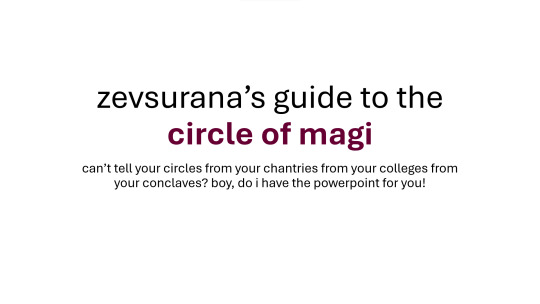
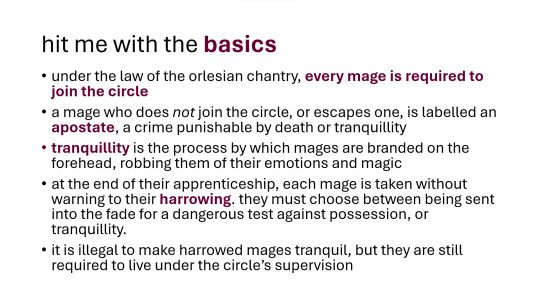
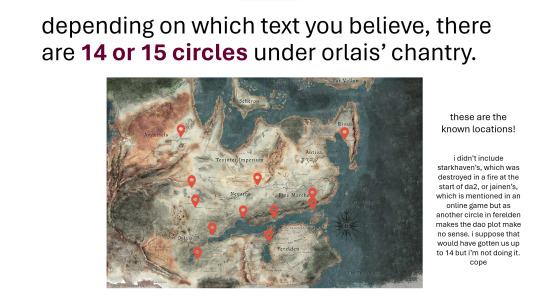
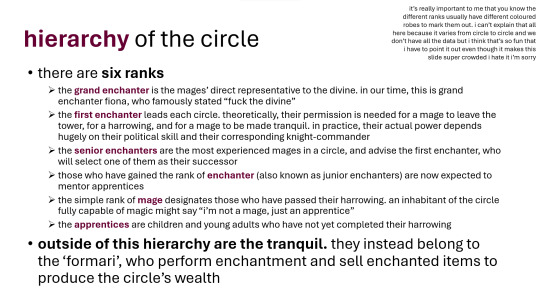
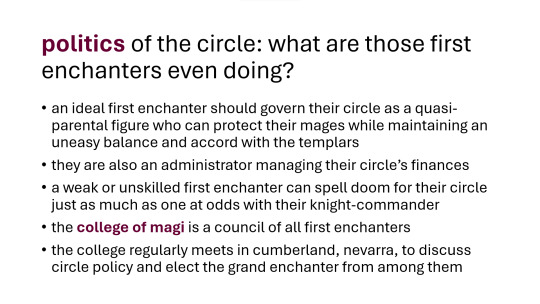



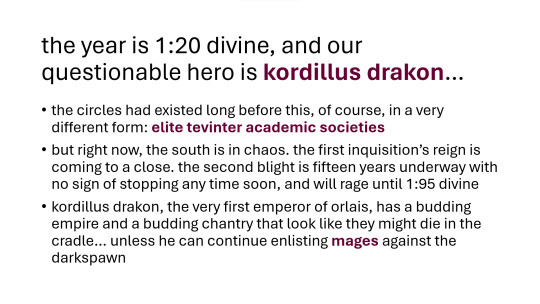
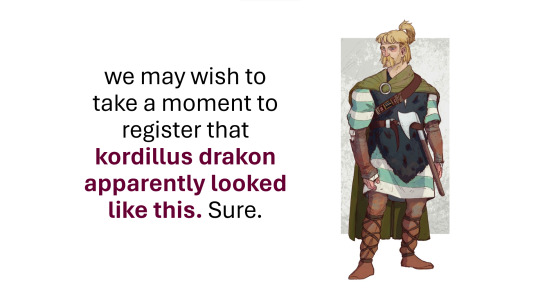
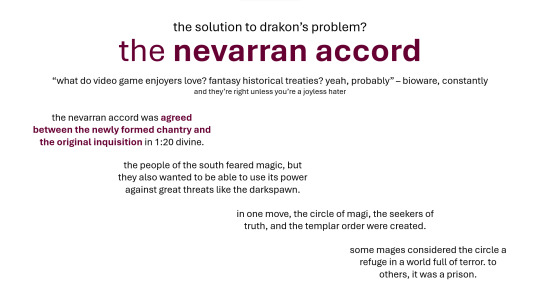
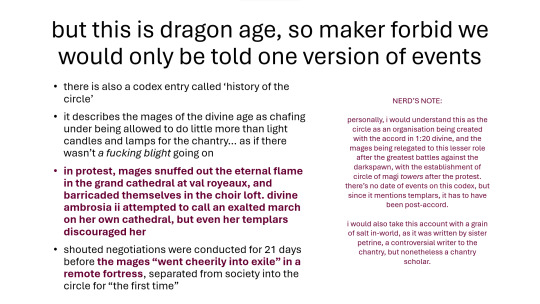
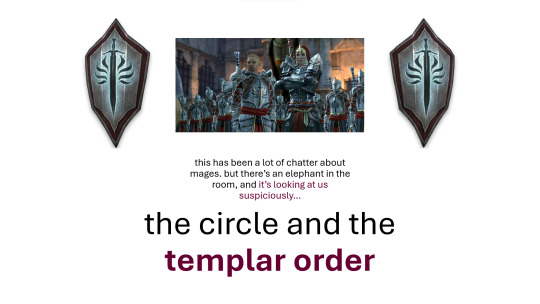
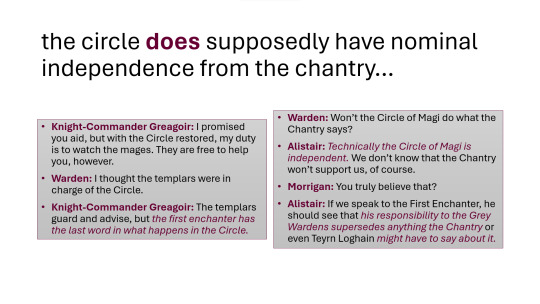
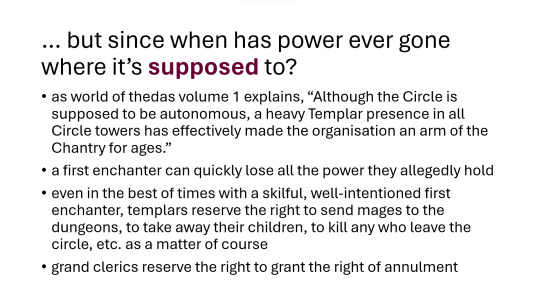

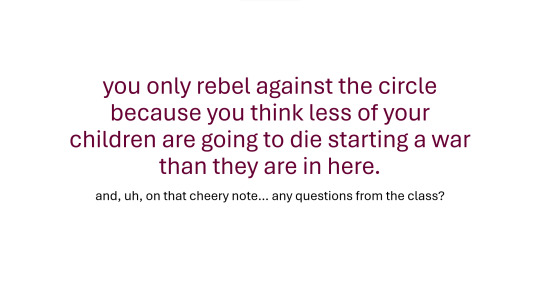
back and even bulkier with another powerpoint! i opted for spreading the information out in a hopefully engaging way over limiting the number of slides. the circle is a BIG, big topic, with such focus over the course of the games, so if i didn't cover anything useful, you want to know anything more specific, or equally if i made a mistake and missed or misinterpreted something, please let me know ily!!
transcript below the cut! my eternal thanks to @bisexualcommandershepard for providing one for the previous powerpoint and in doing so reminding me to get my act together, you have my sword
zevsurana’s guide to the circle of magi
can’t tell your circles from your chantries from your colleges from your conclaves? boy, do i have the powerpoint for you!
hit me with the basics
under the law of the orlesian chantry, every mage is required to join the circle
a mage who does not join the circle, or escapes one, is labelled an apostate, a crime punishable by death or tranquillity
tranquillity is the process by which mages are branded on the forehead, robbing them of their emotions and magic
at the end of their apprenticeship, each mage is taken without warning to their harrowing. they must choose between being sent into the fade for a dangerous test against possession, or tranquillity.
it is illegal to make harrowed mages tranquil, but they are still required to live under the circle’s supervision
depending on which text you believe, there are 14 or 15 circles under orlais’ chantry.
[this slide is accompanied by an image of a map of thedas. there are small markers spread across the map on 12 locations, mostly in orlais and the free marches, but included everywhere except tevinter and seheron.]
these are the known locations!
i didn’t include starkhaven’s, which was destroyed in a fire at the start of da2, or jainen’s, which is mentioned in an online game but as another circle in ferelden makes the dao plot make no sense. i suppose that would have gotten us up to 14 but i’m not doing it. cope
hierarchy of the circle
there are six ranks:
the grand enchanter is the mages’ direct representative to the divine. in our time, this is grand enchanter fiona, who famously stated “fuck the divine”
the first enchanter leads each circle. theoretically, their permission is needed for a mage to leave the tower, for a harrowing, and for a mage to be made tranquil. in practice, their actual power depends hugely on their political skill and their corresponding knight-commander
the senior enchanters are the most experienced mages in a circle, and advise the first enchanter, who will select one of them as their successor
those who have gained the rank of enchanter (also known as junior enchanters) are now expected to mentor apprentices
the simple rank of mage designates those who have passed their harrowing. an inhabitant of the circle fully capable of magic might say “i’m not a mage, just an apprentice”
the apprentices are children and young adults who have not yet completed their harrowing
outside of this hierarchy are the tranquil. they instead belong to the ‘formari’, who perform enchantment and sell enchanted items to produce the circle’s wealth
(it’s really important to me that you know the different ranks usually have different coloured robes to mark them out. i can’t explain that all here because it varies from circle to circle and we don’t have all the data but i think that’s so fun that i have to point it out even though it makes this slide super crowded i hate it i’m sorry)
politics of the circle: what are those first enchanters even doing?
an ideal first enchanter should govern their circle as a quasi-parental figure who can protect their mages while maintaining an uneasy balance and accord with the templars
they are also an administrator managing their circle’s finances
a weak or unskilled first enchanter can spell doom for their circle just as much as one at odds with their knight-commander
the college of magi is a council of all first enchanters
the college regularly meets in cumberland, nevarra, to discuss circle policy and elect the grand enchanter from among them
politics of the circle: what’s this about frat boys?
once a mage achieves the rank of enchanter, they may join a political fraternity
choose your fighter:
the largest fraternity, the aequitarians, are centrists
the loyalists are chantry bootlickers
the libertarians seek greater power and independence for the circle. the resolutionists are an even more radical group that emerged from them
the isolationists wish mages to withdraw from society completely
the lucrosians prioritise the accumulation of wealth and influence
the aequitarians maintained an alliance with the loyalists until the final vote to rebel, when wynne’s son rhys, asked to represent the aequitarians by first enchanter irving, voted with the libertarians
that was a lot of politics.
let’s take a breather because we haven’t even gotten to history yet oh boy
[this slide is accompanied by two pieces of dragon age concept art of white-haired mage women casting spells. one is an older human white woman who may be wynne, dressed in ornate robes and casting purple magic with a casually imperious gesture. the other is the concept art for warden surana, an angry-looking young elven white woman with a palm full of icy magic.]
hot circle mage concept art break. of course you have white hair and [caps lock begins] one thousand points lightning damage-- [caps lock ends]
but where do circles come from, i hear you cry
well, when two semi-circles love each other very much,
the year is 1:20 divine, and our questionable hero is kordillus drakon…
the circles had existed long before this, of course, in a very different form: elite tevinter academic societies
but right now, the south is in chaos. the first inquisition’s reign is coming to a close. the second blight is fifteen years underway with no sign of stopping any time soon, and will rage until 1:95 divine
kordillus drakon, the very first emperor of orlais, has a budding empire and a budding chantry that look like they might die in the cradle… unless he can continue enlisting mages against the darkspawn
we may wish to take a moment to register that kordillus drakon apparently looked like this. Sure.
[this slide is accompanied by concept art of kordillus drakon. he is blond white man in vaguely iron age dress, with an interesting hair cut including bangs, a high half ponytail and a very large moustache. he wears a swamp-green cloak and a black fur pelt over a green and white striped tunic, with a hand-axe slung through his belt, and crossed garters over whatever combination boots and pants he's wearing, which seems to be one singular garment.]
the solution to drakon's problem?
the nevarran accord
“what do video game enjoyers love? fantasy historical treaties? yeah, probably” – bioware, constantly
and they’re right unless you’re a joyless hater
the nevarran accord was agreed between the newly formed chantry and the original inquisition in 1:20 divine
the people of the south feared magic, but they also wanted to be able to use its power against great threats like the darkspawn
in one move, the circle of magi, the seekers of truth, and the templar order were created
some mages considered the circle a refuge in a world full of terror. to others, it was a prison
but this is dragon age, so maker forbid we would only be told one version of events
there is also a codex entry called ‘history of the circle’
it describes the mages of the divine age as chafing under being allowed to do little more than light candles and lamps for the chantry… as if there wasn’t a fucking blight going on
in protest, mages snuffed out the eternal flame in the grand cathedral at val royeaux, and barricaded themselves in the choir loft. divine ambrosia ii attempted to call an exalted march on her own cathedral, but even her templars discouraged her
shouted negotiations were conducted for 21 days before the mages “went cheerily into exile” in a remote fortress, separated from society into the circle for “the first time”
nerd's note:
personally, i would understand this as the circle as an organisation being created with the accord in 1:20 divine, and the mages being relegated to this lesser role after the greatest battles against the darkspawn, with the establishment of circle of magi towers after the protest. there’s no date of events on this codex, but since it mentions templars, it has to have been post-accord.
i would also take this account with a grain of salt in-world, as it was written by sister petrine, a controversial writer to the chantry, but nonetheless a chantry scholar.
this has been a lot of chatter about mages. but there’s an elephant in the room, and it’s looking at us suspiciously…
the circle and the templar order
the circle does supposedly have nominal independence from the chantry…
Knight-Commander Greagoir: I promised you aid, but with the Circle restored, my duty is to watch the mages. They are free to help you, however.
Warden: I thought the templars were in charge of the Circle.
Knight-Commander Greagoir: The templars guard and advise, but the first enchanter has the last word in what happens in the Circle.
...
Warden: Won’t the Circle of Magi do what the Chantry says?
Alistair: Technically the Circle of Magi is independent. We don’t know that the Chantry won’t support us, of course.
Morrigan: You truly believe that?
Alistair: If we speak to the First Enchanter, he should see that his responsibility to the Grey Wardens supersedes anything the Chantry or even Teyrn Loghain might have to say about it.
… but since when has power ever gone where it’s supposed to?
as world of thedas volume 1 explains, “Although the Circle is supposed to be autonomous, a heavy Templar presence in all Circle towers has effectively made the organisation an arm of the Chantry for ages.”
a first enchanter can quickly lose all the power they allegedly hold
even in the best of times with a skilful, well-intentioned first enchanter, templars reserve the right to send mages to the dungeons, to take away their children, to kill any who leave the circle, etc. as a matter of course
grand clerics reserve the right to grant the right of annulment
generally, the system is maintained by a mutual interest in avoiding open conflict
the templars are the ones in power with the chantry’s full support. if they drive the mages to open conflict, their comfortable routine is uprooted
templars are equipped to hunt down individual mages, even blood mages and abominations
templars are not equipped to be outnumbered or face even numbers. mages are simply far more powerful in a fair fight than they are. lyrium can only do so much
...
mages, meanwhile, operate under the not entirely unfounded belief that the outside world is entirely hostile to them
at least if they remain, they can keep an uneasy balance in which most mages survive, their existence tolerated by the chantry. they can continue studying among their own kind in the only home they know
if they openly rebel, they may throw aside what limited protections and goodwill they have. mages like wynne outright state certainty that if they rebel, “genocide” will follow
furthermore, those mages with more status have more access to privilege. they’re also the ones who have best passed the chantry’s tests. thus, those in a position to lead are least inclined to rebel
you only rebel against the circle because you think less of your children are going to die starting a war than they are in here.
and, uh, on that cheery note… any questions from the class?
694 notes
·
View notes
Text
Sometimes I do wish that the Dragon Age games had continued to be localised. Like, I definitely want us to see the maps and meet the people from other continents/countries but I really like that Origins gives you such a comprehensive feel for Ferelden; it's people, it's politics, it's environments. Equally I love that da2 gives you an in depth look into a disaster city state. Sometimes I feel like it would have been better to have inquisition happen primarily in Orlais and give the nation itself more focus; to see the Grand Cathedral, to get a real feel for that society and that country. And I'm worried that DA:D is gonna spread itself thin like inquisition did so we end up not actually getting to immerse ourselve in a specific country and culture in Thedas. Do you feel?
242 notes
·
View notes
Text

EA site update:
"The Dread Wolf Rises
Dragon Age Day 2023
Happy DA Day to our friends across Thedas!"
"[Mark] Dragon Age has always been a franchise about characters. Characters to fall in love with or to learn to loath. Those characters need a place in which to live, to fight, and to love—a place that shapes them and the events they find themselves swept up in. Today we explore the place they call home that forms the stage for everything that you do: Thedas.
Corinne and the Dragon Age: Dreadwolf team have created a game that celebrates the rich and varied past of the franchise while crafting new experiences and stories. It has been incredible to come back to BioWare and see all of the progress they’ve made, and I’m excited for some of that world to be shared with all of you today.
[Corinne] Thank you, Mark! I fondly remember playing each entry in the Dragon Age franchise, being completely immersed and enamored in the world you all had built. It amazes me to be here now, working alongside you and the team, to bring new stories and characters (not to mention a few returning characters) to all of the fans of the franchise. Dragon Age: Dreadwolf is the product of hard work and love. We know how much this world means to all of you, how these experiences stay with you. We want to get it right, so we’ve taken our time.
We're so excited to join in this celebration of all things Dragon Age and the incredible fandom that surrounds it. Within the dev team, we’ve been eagerly awaiting Dragon Age Day as the enthusiasm, stories, charity, and artwork you share motivates us to be our best and create new experiences for all of you.
To celebrate DA Day, we’re sharing a look at a few of the in-game locations you’ll explore on this new adventure (and perhaps a little more for those who listen closely). The stage is set. The Dread Wolf is ready to make his move.
Oh, and one last thing before I go…
In summer 2024, we’ll be fully revealing Dragon Age: Dreadwolf to you!
We honestly can’t wait.
See you all in Thedas,
— Corinne Busche, Game Director & Mark Darrah, Sr Production Advisor"
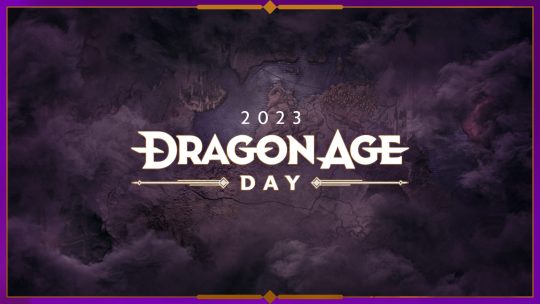

"You’ve visited the lands of Thedas thrice before in our games and many more times in comics, books, art, and short stories. This time, you’ll be venturing to places unseen and returning to places from long ago.
To celebrate Dragon Age Day, we wanted to show you some of those sights. [link to new trailer]
We stand on the precipice of change. This is a world brimming with stories and characters waiting to meet you. The fate of this world teeters on the edge of a knife. In past games, you only got to see a slice of the world. In Origins, it was Ferelden—a land ravaged by war and Dark Spawn. In II, it was Kirkwall and its locales—festering with corruption and a dark underworld. And in Inquisition, you ventured across much of Orlais—facing down political intrigue as often as combat."
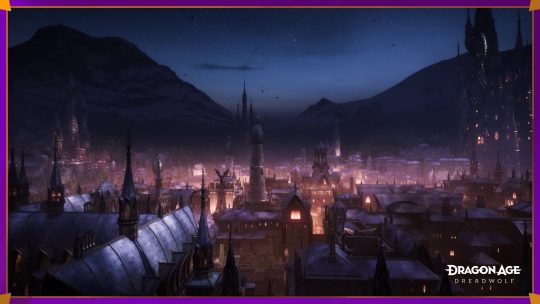
"This time, however, much more of Thedas is yours to see. The desolate, beautiful badlands of the Anderfels with curtains of distant mountainous spires. The twisting canals and gleaming towers of Antiva, where Crows may lurk in any shadow. The turquoise seas of Rivain with its rushes of greenery and hardy sea-faring people. And of course, there’s more."
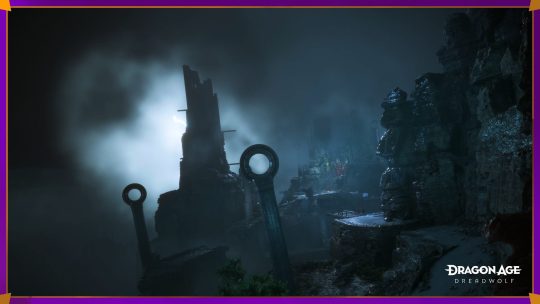
"We felt this was best for the tale we wanted to tell this time and we hope you enjoy it as much as we have! It’s allowed us to create many more locations than past games, including both some you’ve longed to go to…and some you’ve never heard of before!"


"To help capture the wonders of Thedas, we partnered with three wonderful artists from our exceptionally talented community and gave them an early look at what you’ve now seen. We’ve always been so fortunate to have such an incredibly skilled community of artists, and getting to work with these three was a true joy!
We asked each of them to create a vista of one of the three regions in the video based on their interpretation of it in their own unique styles. Please enjoy their wonderful work, and be sure to send them some love when you check out their personal channels for more of their art!" [link to art]

"Turning our focus to your closest kitchen, if you’re looking for a fun gift this holiday season or want to try some Thedosian dishes yourself, we’ve got you covered with Dragon Age: The Official Cookbook: Tastes of Thedas from our partners, Insight Editions! This project was lovingly crafted by the author, Jessie Hasset, as well as members of our team who have an affinity for the kitchen and a love of cuisine."
"The cookbook features recipes suited to all skill levels, but we know that jumping in may be a daunting task for some. To help you out, we’ve partnered with MisoHungrie, a wonderful YouTuber who specializes in cooking, with a particular knack for video game and entertainment-related dishes.
If you’re looking for a place to start on your culinary journey, check out his video and follow along. And be sure to let us know what you think of these Thedosian delights!
In addition to this, there are two giveaways you should keep an eye out for! For the first, our friends over at Insight Editions are giving away five copies of the cookbook on their social channels, so be sure to check them out. And it doesn’t end there.
For those of you who decide to try your hand at making a culinary delight from the book (including one of the ones we’ve released separately), be sure to follow our own Dragon Age social channels for the second giveaway. Keep an eye out for the opportunity to submit your creation for a chance to win a BioWare Gear Store package, including the brand-new Morrigan romance bundle! Details on that giveaway will be posted next week."

"As we mentioned earlier this year, we’ve partnered with Dark Horse to create a digital package of all their comics for Dragon Age and Mass Effect on Humble Bundle. Visit the Humble Bundle page to find out how our partners are working to support Child’s Play, an organization that seeks to make the lives of children in hospitals more comfortable through the enjoyment of games. There’s no better time than the holidays to bring a smile to someone’s face.
BioWare is also supporting a few local charities this month that focus on helping the most vulnerable in our communities via food banks. This includes the Edmonton Food Bank, the Greater Vancouver Food Bank, Les Banques alimentaires au Québec, and the Central Texas Food Bank. All of them provide food to thousands of people each month and rely on kindhearted donations and volunteers.
If you’re wanting to give back this holiday season, please consider supporting Child’s Play or donating to your local food banks. Many communities also accept non-monetary donations of canned, dried, and packaged goods, clothing, and other useful supplies. However you choose to support those in need, know that every bit helps and can make a big difference in someone’s life, whether they’re in your community or around the world."

"An insult that he took as a badge of pride. An insult to inspire hope in his friends and fear in his enemies. That is what Fen’Harel, the Dread Wolf, truly is. Not a man who sees himself as evil, but someone who believes he’s fighting for a good cause and is willing to get his hands dirty.
This long-awaited chapter of Dragon Age is fast approaching—the time close at hand. We’ll see you next summer with answers to your questions, including ones you have yet to ask.
With that will come our full reveal including new trailers, gameplay, and—of course—the long-awaited release date. The Dread Wolf will rise once more and we’ll have much more to share with you as we approach Summer 2024. Please keep an eye on our social channels for all the latest information on Dragon Age: Dreadwolf’s reveal and beyond.
Know this, though: The Dread Wolf has not been idle these past years. His reach is far, and soon his plans will come to fruition—a cataclysmic rejoining of magic and realms hundreds of years in the making.
Will you be able to stop him? We hope so.
Always believing in you,
— The Dragon Age Team"
[source and full post]
#dragon age: dreadwolf#dragon age 4#the dread wolf rises#da4#dragon age#bioware#solas#long post#longpost#video games#morrigan#queen of my heart#post fixed sry ^^
240 notes
·
View notes
Note
How do you think the Dragon Age Inquisition advisors and companions would react to Child Inquisitor being the child of the Champion of Kirkwall? Also could you make Fenris the child Inquisitor's father?
Cassandra: This is...problematic.
Varric had told her enough of the Champion's husband to know that Fenris will already be desperately hunting for his child, and the Champion...so much of their family is lost, it is unthinkable that Hawke will not be in the same state. Trying to convince them both that the inquisition has not kidnapped their offspring for political reasons will require all the tact she does not have.
And will rely on the very little goodwill she can wring from Varric, who she technically did kidnap for political reasons. She will need to keep Josephine close by at all times.
Solas: For so young a child, the dalen is already a political firestorm waiting to happen. The guilt he carries from having his magic stitched into their very flesh (and the pain this child is feeling from it) was already enough to convince him to stay, but being so close to the power center of both Inquisition and the Champion of Kirkwall is an unexpected boon. He will keep his finger on the pulse of all things anchor related, and keep himself close to the actions that are working to restore Thedas to order.
And by helping this child now, keep himself on the right side of a very angry elf who might be a problem before the Dread Wolf has his power returned.
Varric: Okay so, here’s the most important thing: he should have known.
Logically there is no way that Varric Tethras-Kirkwall’s author in residence and nominally a captive of the Right Hand of the Divine- could have known that the child of his best friend in the entire world had somehow snuck away from home AND traveled halfway across the blessed world AND infiltrated a highly secure theo-political conclave designed to reign in a burgeoning civil war to enact some sort of temporary peace. He has contacts and resources and keeps an ear to the ground, but that doesn’t mean the Merchant’s Guild can tell him everything the minute it happens.
And yet the fact that a child exists in the world who is half Fenris (impulsive and quick to defend what is his) Hawke (and carries the legacy of that family) really does mean that there wasn’t anywhere else they’d end up. It’s not a comfort to Varric when the Seeker and his best friend’s kid crest the hill toward them, but it certainly changes his standing with the Inquisition. So long as the kid is there Varric’s not leaving-- he owes Hawke at least that much and more. One way or another things are going to have to be put to rights.
Blackwall: Once, as another man in another life, his actions had led to the death of four children. Even then, in the height of his arrogance and conceit, Thom Rainier had stood over those small shrouded forms and would have given his own life a hundred times over to spare them. Nothing could have brought them back, of course, and no matter how many times he had knelt before Andraste's statues and begged for Her forgiveness it was not a burden he could lay down himself.
This child, Andraste's herald or not, is not a replacement for Collier's children. Defending their life will not wipe out the debt he owes to that slaughtered family. But as he shoulders his shield and sword in their defense, it just might be a start to that forgiveness.
That will be enough.
Vivienne: Children are not in a Circle mage's destiny, no matter how high her star may climb. The dreams of children with her perfect bone structure and Bastien's eyes will forever be only that. Madame de Fer has come to accept this, has spent her entire life accepting this. If she is softer with the new apprentices newly torn from their families, more patient with the young mages still struggling with a life behind walls, that is no one business but her own.
The Herald of Andraste is a child. No matter their illustrious parentage or the fame carried by those parents, they are too young to be bandied about as some sort of divine tool to rescue the world. The Game has no minimum age, of course, and Vivienne is not naive enough to think that Hawke's offspring will not have to play it in time, but she will be taking special care to to keep both eyes on the child to whom they will ask so much of.
And a sharper eye on those who would use them. Fenris is not the only one who can glow, when needed.
Sera: Little people need looking out for, and not much littler than a sprog. From the first jump their tiny Herald has an ever devoted guardian, one who ensures there is as much fun as serious herald business, and cookies for all.
When the parents do eventually arrive, her general distrust of all things magic and ardent desire to preserve their childhood will endear her to Fenris like none other in the Inquisition. Someone must look out for the little people, and while their methods are not the same each can respect the other.
Dorian: Vishente Kaffas, this is a child. In the light of that discovery a great many of his opinions on Alexius's plans (mostly on how his mentor is simply desperate to save Felix and not thinking clearly) and brutally altered. This man who wants to murder someone hardly old enough to see over the table is not the man he once knew, and there are no excuses he can make that will make it less barbaric.
By the time they are escaped from that terrible Not-Future Dorian has formed a trauma bond with this young person as profound as any he has known, and their safety is now absolutely his priority. Despite his disinclination for their creation Dorian is not opposed to children, and along with others is very content to take over their education in all things both mundane and magical.
Fenris's arrival is still loud and bright and involves quite a few angry comments between former slave and not yet magister, but in the end Dorian's unshirking resolve toward the young Herald will carry the day. When Fenris eventually finds out that his child is set to inherit Dorian's seat in the Magisterium as the heir to the current Pavus heir, that argument will be even louder.
Iron Bull: The Qun is very clear on the care and feeding of children in their charge, and it has never been in his destiny to be a Tamassran. Nor is the Iron Bull ignorant of the identity of the Inquisitors parents. But seeing how small the Herald is, something deep and protective in the mercenary captain surprises even himself.
(His Tama is both surprised and not to get a letter from her former charge, and if her memories of the little boy hold true he will read her meaning in the otherwise clinical advise on the care and keeping of young children.)
Watching the Chargers adopt the little Herald as one of their own has another lasting effect. There is no decision on the Storm Coast, not with this true understanding o family, and in truth Bull was lost to the Qun long before Gatt came south with an unbeatable test.
Cole: "So young, so bright, wanted to come south to find Uncle Varric, never meant to hurt anyone. You just wanted to help, to heal the hurt and make it whole. I want that too!"
The innocent and ardent desire of children to do good, and the boundless compassion that comes with youth, makes the Herald and Cole perfect companions. This friendship is strained by the arrival of Fenris's Anders driven loathing of abominations, but a more patient Hawke might ease the way there.
Josephine: She has younger siblings, and is currently responsible for the fate of House Montiliyet. The care and feeding of one small child is...well, child's play. If only Cassandra would not keep pulling her aside like some talisman against the Champion of Kirkwall.
If it were less entertaining, their ambassador might have informed the Seeker that her letters to Aveline Vallen have already abated much suspicion...
Leliana: There are one or two amongst her agents who have some experience with children, and she assigns them watch over their Herald. Beyond that, the spymaster keeps a distance. A child need not know all the brutal things done to keep the world turning. That is sacrifice enough.
If, every once in a while, the young herald is soothed after a nightmare with Ferelden lullabyes in an Orlesian accent, few are brave enough to share it.
Cullen: Maker's breathe, he'd thought he left Kirkwall behind him. Like Leliana he assigns soldiers who either are parents or who are good with children to keep a weather eye on the child, and adopts Cassandra's strategy of using Josephine as a shield against Champion and/or Lyrium Ghost rage.
Once was enough.
Mod Fereldone
#dragon age inqusition#child inquisitor#solas#dorian pavus#blackwall#cassandra pentaghast#vivienne de fer#the iron bull#cole#cullen rutherford#josephine montilyet#lelianna#hawke#fenris#varric tethras
222 notes
·
View notes